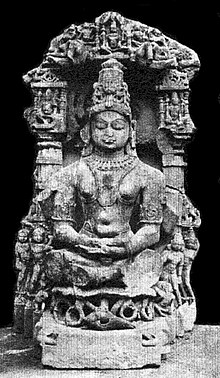
Back Buddha Awatara BAN Gautama Buddha sa Hinduismo BCL হিন্দুধর্মে গৌতম বুদ্ধ Bengali/Bangla Siddhartha Gautama dans l'hindouisme French हिन्दू धर्म में गौतम बुद्ध Hindi Gautama Buddha a hinduizmusban Hungarian Siddhartha Gautama dalam Hinduisme ID ヒンドゥー教における釈迦 Japanese Buda Gotama ing Hindhu JV ಹಿಂದೂ ಧರ್ಮದಲ್ಲಿ ಬುದ್ಧ Kannada
| Buddha | |
|---|---|
| Member of Dashavatara[1] | |
 Buddha incarnation of Vishnu, from Sunari, Medieval period | |
| Other names | Siddhartha Gautama, Mayamoha |
| Devanagari | बुद्ध |
| Affiliation | |
| Mantra | Om Muni Muni Mahamuni Shakyamuniye Svaha |
| Symbols | Swastika, Dharmachakra, Modaka |
| Day | Thursday |
| Texts | |
| Gender | Male |
| Festivals | Buddha Purnima |
| Personal information | |
| Born | Siddhartha Gautama c. 563 BCE or 480 BCE |
| Died | c. 483 BCE or 400 BCE (aged 80)[2][3][4] |
| Parents | Śuddhodana (father) Maya (mother) Pajapati (step-mother) |
| Consort | Yaśodharā |
| Children | Rāhula (son) |
| Dynasty | Raghuvamsha-Suryavamsha |
| Dashavatara Sequence | |
|---|---|
| Predecessor | Krishna |
| Successor | Kalki |
| Part of a series on |
| Hinduism |
|---|
 |
| Part of a series on |
| Vaishnavism |
|---|
 |
The Buddha (Sanskrit: बुद्ध, lit. ''the enlightened one'') is considered the ninth avatar among the ten major avatars of the god Vishnu, according to the Vaishnava tradition of Hinduism.[5][6][7][8][note 1]
The Buddha has been among the formative forces in the origins of Hinduism. Regional Hindu texts over the centuries have presented a spectrum of views on Buddhism, possibly reflecting the competition between Buddhism and the Brahmanical traditions.[9] In contemporary Hinduism, the Buddha is revered by Hindus who usually consider "Buddhism to be another form of Hinduism".[9] Other Hindus reject the identification of Gautama Buddha as an avatar of Vishnu, referring to the texts of the Puranas and identifying the two as different individuals.
- ^ "Incarnations of Vāsudeva [Chapter 18]". 5 March 2020.
- ^ Cousins (1996), pp. 57–63.
- ^ Norman (1997), p. 33.
- ^ Prebish (2008).
- ^ Srinivasan 2011, p. 182.
- ^ Lochtefeld 2002, p. 73, 128.
- ^ Holt 2008, p. 18–21.
- ^ Holt, Kinnard & Walters 2012, p. 4, 95, 111.
- ^ a b Jones & Ryan 2006, p. 96.
Cite error: There are <ref group=note> tags on this page, but the references will not show without a {{reflist|group=note}} template (see the help page).
© MMXXIII Rich X Search. We shall prevail. All rights reserved. Rich X Search